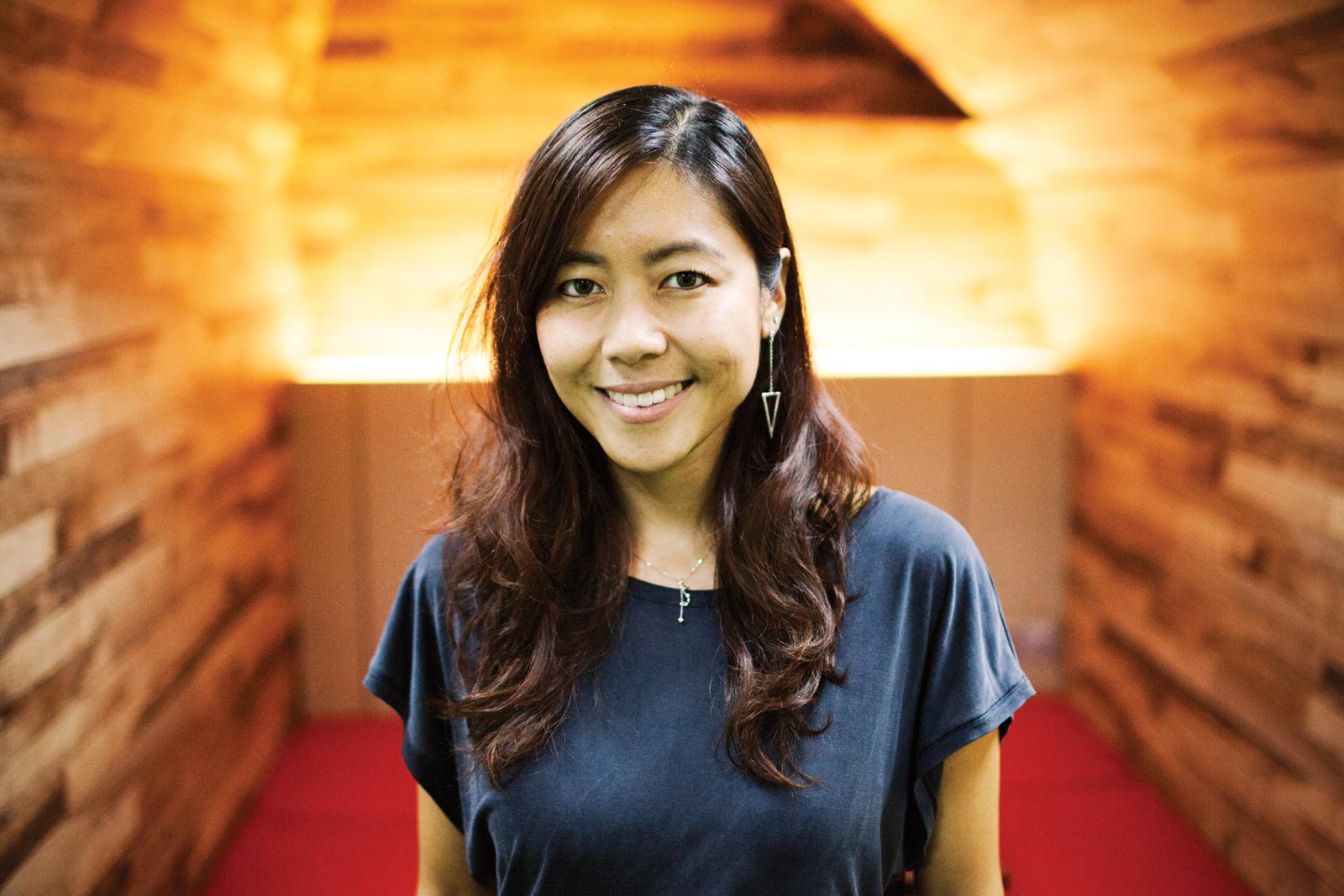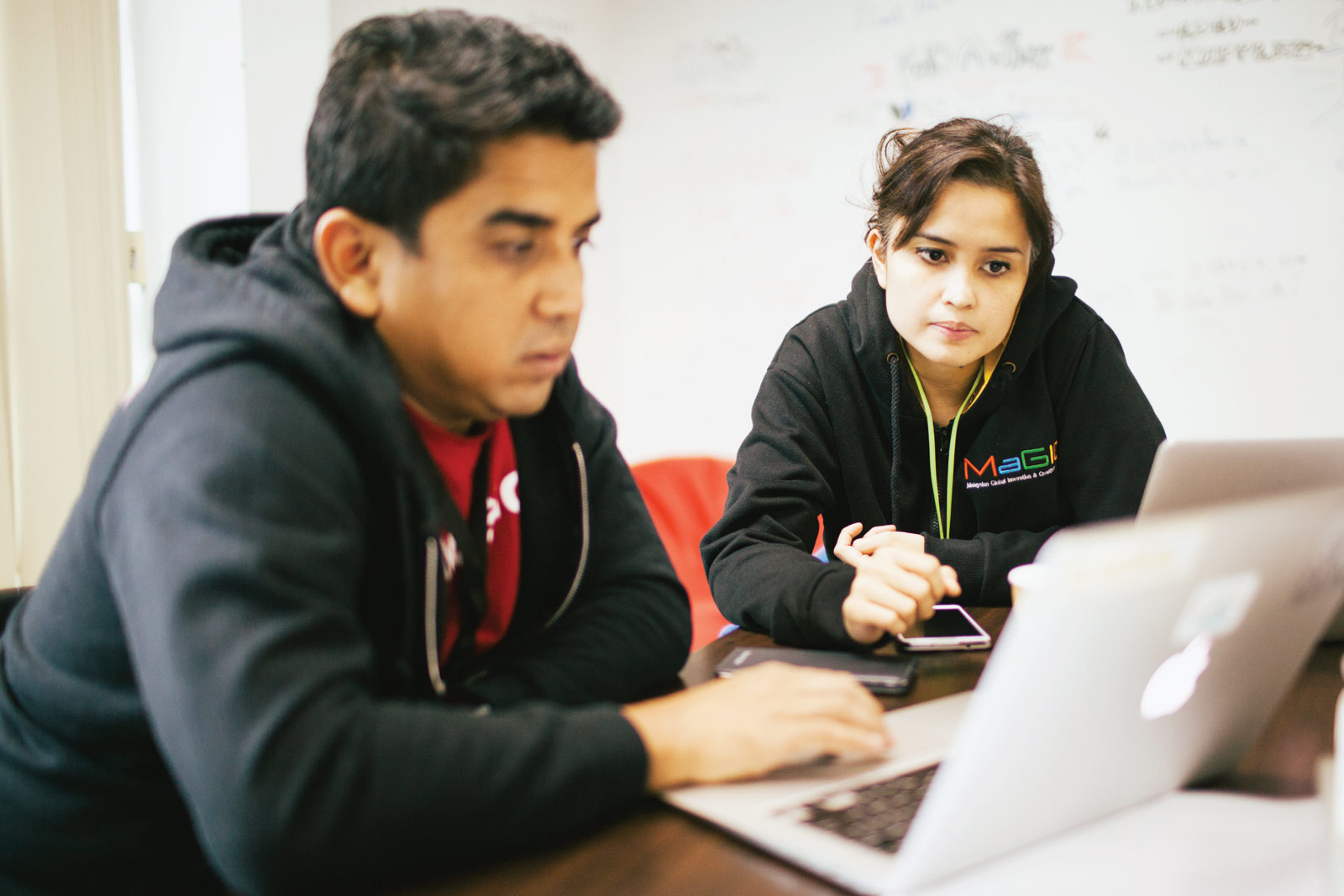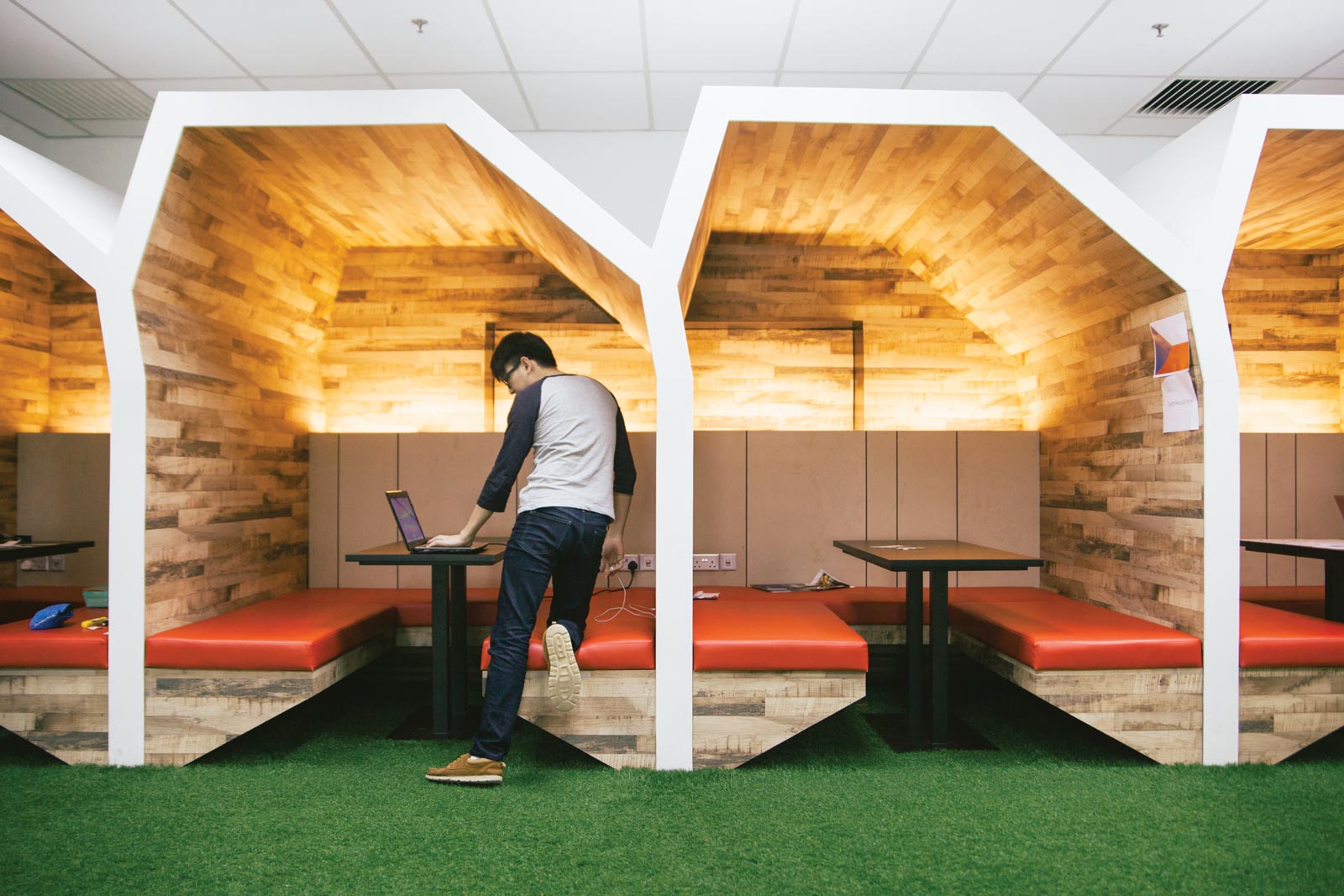
It is 2:15pm on a Thursday and two twentysomething Malaysians have taken a break from work to play table tennis. “This is a lot like tennis,” says the guy clad in black skinny jeans. “Yeah, but with less running around. Normal tennis is so tiring,” replies his opponent, who sports a black beanie and thick-rimmed glasses.
To the right of the table is a large area of fake turf scattered with beanbags in bright shades of red, blue and yellow. Inside an onsite café, named Chill X, an old bicycle hangs from the wall and a retro arcade game beeps away in the corner, desperate for a little attention.
Southeast Asia Globe is exploring the offices of the Malaysian Global Innovation and Creativity Centre (Magic) and, although it lacks the slides and ball pit working spaces, its likeness to a certain California-based multinational tech firm is striking. Brightly coloured co-working spaces, an auditorium and numerous seminar rooms all house creative young things who are busily trying to create the next Uber or WhatsApp.
Successful female entrepreneur
We finally arrive at our destination, a workspace where a smiling Cheryl Yeoh, 32, who has been described as a Southeast Asian startup “superstar”, is waiting.
“I got my entrepreneurial streak from my mum,” she says. “A lot of Asian parents are like study, study, study, get good grades, right? But my parents were a bit different, my mum specifically. She’d say: ‘Oh we have junk in our garage, do you wanna go sell it?’ Even as a little kid I was convincing a stranger to buy our stuff.”
Cheryl says she is from “a relatively poor background” and did not leave Malaysia until she received a scholarship to study engineering at Cornell University, one of the finest in the US. After an unhappy spell as a management consultant, Yeoh started her first company aged 27, becoming part of the first wave of tech startup entrepreneurs in New York.
Her first company was a digital wallet for daily deals named CityPockets, which raised “a million bucks” in venture capital money. “However, about halfway through building that company we realised that it wasn’t going to remain sustainable. So we had to shut it down and we started [a new company called] Reclip.it.”
This shopping app matches the user’s personal shopping list with digital coupons and weekly specials from top retailers. It also propelled Yeoh into the tech startup big leagues. She was named on Mashable’s ‘Top 44 Female Founders Every Entrepreneur Should Know’ list, Reclip.it was included in a list of the ‘Best of the Web 2012’ by InStyle magazine and, perhaps most importantly, the app necessitated a move to Silicon Valley, an area of San Francisco that is home to hundreds of startups and global tech companies including Apple and Google.

The collective sentiment in the valley is very positive, encouraging, anything is possible and they’re very accepting of failure, which is a thing Asia is still learning to accept
In 2013, Reclip.it was acquired by Walmart Labs, the US retail giant’s innovation and internet arm. Shortly after the sale, Yeoh returned to Malaysia to become founding CEO of Magic, the government-backed programme that was described by Prime Minister Najib Razak as “a one-stop shop for entrepreneurs – with everything from getting financing from banks or venture capital to incubators for developing start-ups; from intellectual property registration to facilities for training, coaching and mentoring”.
Within minutes of speaking with Yeoh, it is clear that 12 years in the US has reshaped her. This manifests itself in many ways, not least her tendency to end sentences with a rhetorical “right?” and use the word ‘super’ as an adverb – things are “super crucial” and get done “super quick” in Yeoh’s world. Nonetheless, it is refreshing to speak to a business leader who is as down-to-earth and relatable as Yeoh – one who uses sentences such as “I used to suck at public speaking.”
The US is also largely responsible for making her the businesswoman she is today. In February, Yeoh moved back to Silicon Valley after agreeing with the Ministry of Finance to end her contract at Magic, though she still works in a consultancy capacity for a number of Malaysian companies. So familiar is she with Silicon Valley that she simply refers to it as ‘the valley’ and she clearly feels an affinity for the creativity and excitement of the world’s most famous tech hub.
“What’s the biggest lesson I learned in the valley? The key thing is focus. It’s very hard to say no to something, but if you don’t say no then you’re doing too many things and you’re not going to do anything well because your time is split.”
One of Yeoh’s favourite topics is the numerous elements that must come together to create a favourable environment for startups – essentially what she spent almost two years trying to do at Magic, which is based in Cyberjaya, Malaysia’s tech city on the outskirts of Kuala Lumpur that is home to 38 multinationals and almost 800 tech-oriented companies. She cites a book titled Startup Communities by Brad Feld, an accomplished venture capitalist who works out of Colorado. The book describes how to set up startup hubs outside of the Silicon Valley bubble and designates the government as a ‘feeder’ and the entrepreneur as a ‘leader’.
A model to follow
It is a model seemingly followed by the Malaysian government, where the feeder is responsible for providing infrastructure, resources and policies. The leader is the person or persons who heads the startup community, and they should be an entrepreneur themselves, à la Yeoh.
“A healthy startup ecosystem has to be led by real entrepreneurs with their own high-growth startups – not event organisers, government bureaucrats or corporate executives,” says Yeoh. “Startup ecosystems should never be politically influenced and the motivation for nurturing entrepreneurs cannot be driven by money or big government contracts.
Indeed, as Magic’s founding CEO, Yeoh enjoyed a certain amount of freedom to shape the centre. But, surprisingly, she did not take too many of her leads from Silicon Valley. “A lot of the stuff we did at Magic is not really from the valley, which is 50 years in the making, but from witnessing how a financial hub transformed itself into the second-most-vibrant tech hub in the country, which is what New York did in three short years.”
As well as providing a space where every aspect of building a company is nurtured, each startup at Magic gets four months to work on their product before giving a final pitch to 200 investors who fly in from around the world for a demo day. The hope is that these investors fund the entrepreneurs after they graduate.
Unfortunately, as Yeoh says, “in Southeast Asia there’s no Google or Facebook to buy these companies”, so acquisitions usually come from China, Japan or Australia. Companies such as Tencent and Baidu in China, Rakuten and SoftBank in Japan, and seek.com in Australia are some of those in a position to acquire Southeast Asian companies. Being bought out, Yeoh is keen to emphasise, is one of the most important parts of the process.
“When people build startup ecosystems, they usually forget to think about exits, meaning getting a return… In this very young ecosystem you do need some exits to provide liquidity for the early investors so they have returns and can reinvest that money back into new startups.
“Like me, Walmart bought my company, so I can afford not to work for a few years and start another company. I put the money from Walmart back into my new company, and that’s how I create companies. In a new ecosystem that is doubly important.
Governments should hire the right people and leave them alone to run what is good for the ecosystem and not dictate what should be done. Entrepreneurship has to be completely colour blind.

“We’re on our first wave of companies at the moment in Malaysia, and a lot will fail. Then the second time around those people who failed will come back. I’d say that usually the third wave is where you see some maturity, because entrepreneurs have been recycled and come back to create new companies. We’re on the first cycle; getting to the second and third cycles will take a few years.”
When discussing the Malaysian government’s role in particular, Yeoh is adamant it has “totally been supportive of entrepreneurship” but has pinpointed ways it could do even more.
“We’ve seen huge private corporations come to Magic and they want to hear the pitches and meet the entrepreneurs. They all want to set up a fund or an incubator, but they don’t know how. So I think perhaps the government could offer some incentives or guidance on that,” she says. “Also, the government can’t support this forever – eventually it needs to be the private sector that drives it. The government just has to be, like: “Heeeyyy, how about you take over some of our programmes?”
One thing Yeoh is especially keen to emphasise from her time at Magic is its regional focus. She estimates that 80% of the entrepreneurs using the facilities were Southeast Asian, and those from outside were welcome as long as their focus was on the regional market. Indeed, the Asean Centre of Entrepreneurship (Ace) had a clear mandate of encouraging Southeast Asian startups to come to Malaysia, offering services such as company incorporation, intellectual property and accounting.
“You need to open up borders because we don’t know what we don’t know, and we need to get outsiders coming in to really push our local entrepreneurs,” says Yeoh. “Plus, if you’re starting a regional company and you’re ready to expand to Indonesia or Thailand or the Philippines, it’s useful to know someone there.”
Worldwide startup success
There is no doubt that Yeoh is all about going big. When discussing worldwide startup success stories there is noticeable excitement and admiration in her voice. Looking ahead, she anticipates big things for Southeast Asia, but does not seem interested in the small fry.
“I don’t see Malaysia as a market in itself, as it’s too small, but it’s a very good operating base for entrepreneurs to launch their Southeast Asian companies, because we’re English-speaking, we’re multilingual, there’s low operating costs.
Right now the kinds of companies that get people excited are the ones that can scale very, very quickly: the companies that can go from zero to a billion dollars in a couple of years.
“Like, I use WhatsApp to run my whole company now, and WhatsApp was started by two people who sold their company for $16 billion in a couple of years. It’s those companies that have the potential to change our daily lives that every government is striving for.
“However, not every product is suitable for this region, or perhaps it’s not here yet, so which local entrepreneur is going to create that same product here, so that it’s localised, it’s contextualised and it’s cheaper? There’s a lot of opportunity that entrepreneurs are not tapping into yet and that is the thing we need to encourage.”

